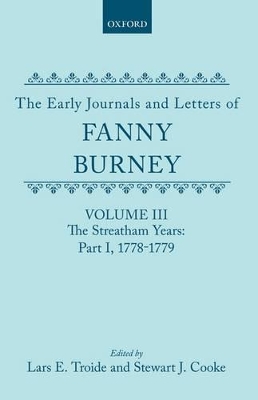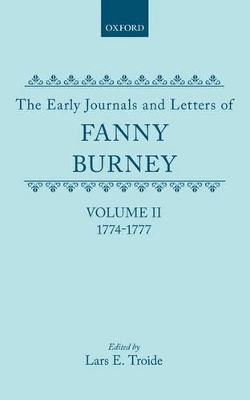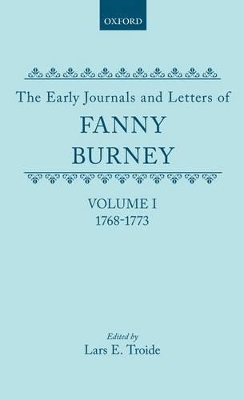Early Journals & Letters of Fanny Burney
3 total works
The Early Journals and Letters of Fanny Burney: Volume III: The Streatham Years, Part I, 1778-1779
by Fanny Burney
Published 25 August 1994
At the beginning of 1778, twenty-five-year-old Fanny Burney, second daughter of England's most eminent musicologist, Dr Charles Burney, was an unknown. By the year's end, however, she had emerged from his shadow as the author of Evelina, or, A Yound Lady's Entrance into the World, a universally acclaimed novel which admirers ranked with the works of Fielding and Richardson.
The present volume - the third of a projected twelve-volume critical edition of Burney's earlier journals and letters - covers the period from January 1778 to December 1779. It reveals her striking transformation into a `celebrity' as she is welcomed into London's literary society, and her mixed delight and terror at this reception. As Burney becomes a regular at the Streatham Park home of Henry and Hester Thrale, she is befriended by another regular visitior, Samuel Johnson, and given the opportunity to observe and record the playful and affectionate side of Johnson's character, a side largely missed by Boswell. Urged by the Streathamites to write a comedy for the London stage, she responds with `The Witlings', a satiric portrait of London's bluestockings. Alarmed by the prospect of disapproval from the powerful bluestocking Elizabeth Montagu, Burney's father and her friend Samuel Crisp dissuade her from releasing the piece. Her disappointment is eased by the whirling social life that she enjoys in the company of the Thrales at Streatham and at Brighton, and on which she comments with characteristic perception and humour.
The present volume - the third of a projected twelve-volume critical edition of Burney's earlier journals and letters - covers the period from January 1778 to December 1779. It reveals her striking transformation into a `celebrity' as she is welcomed into London's literary society, and her mixed delight and terror at this reception. As Burney becomes a regular at the Streatham Park home of Henry and Hester Thrale, she is befriended by another regular visitior, Samuel Johnson, and given the opportunity to observe and record the playful and affectionate side of Johnson's character, a side largely missed by Boswell. Urged by the Streathamites to write a comedy for the London stage, she responds with `The Witlings', a satiric portrait of London's bluestockings. Alarmed by the prospect of disapproval from the powerful bluestocking Elizabeth Montagu, Burney's father and her friend Samuel Crisp dissuade her from releasing the piece. Her disappointment is eased by the whirling social life that she enjoys in the company of the Thrales at Streatham and at Brighton, and on which she comments with characteristic perception and humour.
The Early Journals and Letters of Fanny Burney: Volume II: 1774-1777
by Fanny Burney
Published 27 September 1990
The years 1774-1777 saw Fanny Burney's increasing occupation with her novel Evelina, which she finally completed and presented to the publisher Thomas Lowndes. Like her novel, the journals of this period reveal her artistic powers as she continues to sketch characters with economy and precision and create convincing narratives out of the events of her life. Among the more memorable figures she meets at her father's London house are the `noble savage' Omai, the first Tahitian brought back to England; the famed explorer James `Abyssinian' Bruce, who returned from Africa with tales of natives who ate raw flesh; and Prince Aleksei Orlov of Russia, who had murdered Czar Peter III in order to permit Peter's wife Catherine (`the Great') to ascend the throne. Other notable figures include Dr Samuel Johnson and the great singer Lucrezia Agujari, admired by Mozart. Also in these pages the usually diffident Miss Burney takes charge of her destiny by rebuffing her suitor Thomas Barlow, who has wealth, education, good looks, and the vehement approval of most of her family, but whom she finds a total bore.
The Early Journals and Letters of Fanny Burney: Volume I: 1768-1773
by Fanny Burney
Published 2 June 1988
Fanny Burney was best known in her own time as the author of Evelina and other novels. Her modern reputation, however, rests primarily on her extensive journals and letters, first published posthumously by her niece and literary executive, Mrs Charlotte Barrett.
In this initial volume of a new edition, Fanny's earliest journals are published for the first time in their original state, freed from the prudent afterthoughts of Fanny's old age. Much new material emerges from a deciphering of several thousand lines heavily scored over by Fanny. We here encounter the keenly observed world of a precocious young girl, expanding outward from the comfort and security of a London middle-class home to the glittering excitement of the capital, with its theatres, operas, pleasure grounds, and park promenades. Principal stars in these pages are Fanny's father, the music historian Dr Charles Burney; her sister Hetty and stepsister Maria Allen, whose love affairs read like a romantic novel; and Dr Burney's old friends Samuel Crisp - virtually a second father to Fanny - and David Garrick, the famous actor. Only a teenager, Fanny already sketches these and a host of other memorable characters with the sure hand of a seasoned artist. The result is a lively and fascinating portrait of Georgian England.
In this initial volume of a new edition, Fanny's earliest journals are published for the first time in their original state, freed from the prudent afterthoughts of Fanny's old age. Much new material emerges from a deciphering of several thousand lines heavily scored over by Fanny. We here encounter the keenly observed world of a precocious young girl, expanding outward from the comfort and security of a London middle-class home to the glittering excitement of the capital, with its theatres, operas, pleasure grounds, and park promenades. Principal stars in these pages are Fanny's father, the music historian Dr Charles Burney; her sister Hetty and stepsister Maria Allen, whose love affairs read like a romantic novel; and Dr Burney's old friends Samuel Crisp - virtually a second father to Fanny - and David Garrick, the famous actor. Only a teenager, Fanny already sketches these and a host of other memorable characters with the sure hand of a seasoned artist. The result is a lively and fascinating portrait of Georgian England.


